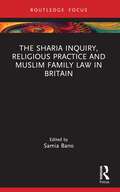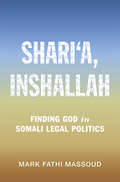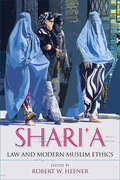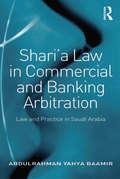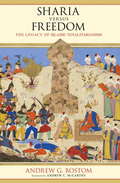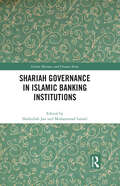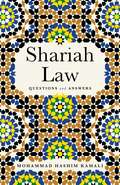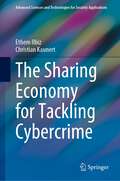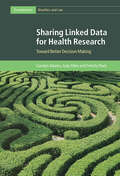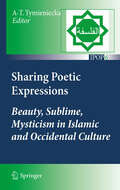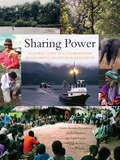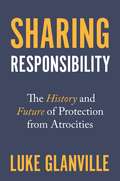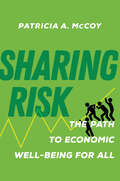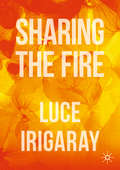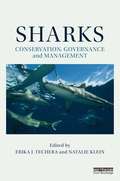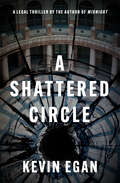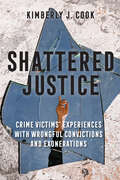- Table View
- List View
Shariʿa in the Modern Era
by Iyad ZahalkaWritten by the Qadi (judge) of the Shari'a Court of Jerusalem and former director of the Shari'a Court system in Israel, this book offers a unique perspective on the religious law of Muslim minorities living in the West. Specifically, it explores the fiqh al-aqalliyyāt doctrine of religious jurisprudence developed by modern Islamic jurists to resolve the challenges of maintaining cultural and religious identity in majority non-Muslim societies. The author examines possible applications across numerous cultural and geographical contexts, answering such questions as: what are the rules for assuming political and public roles, and should one deposit money that incurs interest? Building on a growing scholarship, this book aims to resolve points of view and facets of religious law that have been neglected by previous studies. Accessibly written, Shari'a in the Modern Era is designed to promote cross-cultural understanding among readers of all faiths.
The Sharia Inquiry, Religious Practice and Muslim Family Law in Britain (Islam in the World)
by Samia BanoIn February 2018, the ‘Independent Review on Sharia Law in England and Wales’ was published, headed by Professor Mona Siddiqui. The review focused on whether sharia law is being misused or applied in a way that is incompatible with the domestic law in England and Wales, and, in particular, whether there were discriminatory practices against women who use sharia councils. It came about after years of concerns raised by academics, lawyers and women’s activists. This timely collection of essays from experts, scholars and legal practitioners provides a critique and evaluation of the Inquiry findings as a starting point for analysis and debate on current British Muslim family law practices in the matters of marriage and divorce. At the heart of the collection lie key questions of state action and legal reform of religious practices that may operate ‘outside the sphere of law and legal relations’ but also in conjunction with state law mechanisms and processes. This cutting-edge book is a must read for those with an interest in Islamic law, family law, sociology of religion, human rights, multiculturalism, politics, anthropology of law and gender studies.
Shari‘a, Inshallah: Finding God in Somali Legal Politics (Cambridge Studies in Law and Society)
by Mark Fathi MassoudWestern analysts have long denigrated Islamic states as antagonistic, even antithetical, to the rule of law. Mark Fathi Massoud tells a different story: for nearly 150 years, the Somali people have embraced shari'a, commonly translated as Islamic law, in the struggle for national identity and human rights. Lawyers, community leaders, and activists throughout the Horn of Africa have invoked God to oppose colonialism, resist dictators, expel warlords, and to fight for gender equality - all critical steps on the path to the rule of law. Shari'a, Inshallah traces the most dramatic moments of legal change, political collapse, and reconstruction in Somalia and Somaliland. Massoud upends the conventional account of secular legal progress and demonstrates instead how faith in a higher power guides people toward the rule of law.
Shari'a Law and Modern Muslim Ethics
by Robert W. HefnerMany Muslim societies are in the throes of tumultuous political transitions, and common to all has been heightened debate over the place of shari`a law in modern politics and ethical life. Bringing together leading scholars of Islamic politics, ethics, and law, this book examines the varied meanings and uses of Islamic law, so as to assess the prospects for democratic, plural, and gender-equitable Islamic ethics today. These essays show that, contrary to the claims of some radicals, Muslim understandings of Islamic law and ethics have always been varied and emerge, not from unchanging texts but from real and active engagement with Islamic traditions and everyday life. The ethical debates that rage in contemporary Muslim societies reveal much about the prospects for democratic societies and a pluralist Islamic ethics in the future. They also suggest that despite the tragic violence wrought in recent years by Boko Haram and the Islamic State in Iraq, we may yet see an age of ethical renewal across the Muslim world.
Shari’a Law in Commercial and Banking Arbitration: Law and Practice in Saudi Arabia
by Abdulrahman Yahya BaamirThis book provides an analysis of how commercial and banking disputes can be settled under the Islamic regime for arbitration. The work focuses on the Saudi legal system as representative of Shari'a law in commercial and banking arbitration, and where relevant, makes comparisons with the settlement of banking disputes in Egypt and the UAE. Shari'a Law in Commercial and Banking Arbitration provides a general introduction to the Saudi law and to the main principles and sources of Islamic Shari'a, on which Saudi law is based. It explores uncertainties resulting from the current system, such as the payment of interest, and examines possible alternative remedies for both domestic and international banking arbitration. It will be key reading for anyone interested in business and commercial law.
Shari'a Scripts: A Historical Anthropology
by Brinkley MessickA case study in the textual architecture of the venerable legal and ethical tradition at the center of the Islamic experience, Sharīʿa Scripts is a work of historical anthropology focused on Yemen in the early twentieth century. There—while colonial regimes, late Ottoman reformers, and early nationalists wrought decisive changes to the legal status of the sharīʿa, significantly narrowing its sphere of relevance—the Zaydī school of jurisprudence, rooted in highland Yemen for a millennium, still held sway.Brinkley Messick uses the richly varied writings of the Yemeni past to offer a uniquely comprehensive view of the sharīʿa as a localized and lived phenomenon. Sharīʿa Scripts reads a wide spectrum of sources in search of a new historical-anthropological perspective on Islamic textual relations. Messick analyzes the sharīʿa as a local system of texts, distinguishing between theoretical or doctrinal juridical texts (or the “library”) and those produced by the sharīʿa courts and notarial writers (termed the “archive”). Attending to textual form, he closely examines representative books of madrasa instruction; formal opinion-giving by muftis and imams; the structure of court judgments; and the drafting of contracts. Messick’s intensive readings of texts are supplemented by retrospective ethnography and oral history based on extensive field research. Further, the book ventures a major methodological contribution by confronting anthropology’s longstanding reliance upon the observational and the colloquial. Presenting a new understanding of Islamic legal history, Sharīʿa Scripts is a groundbreaking examination of the interpretative range and historical insights offered by the anthropologist as reader.
Sharia Versus Freedom
by Andrew G. BostomAuthor Andrew G. Bostom expands upon his two previous groundbreaking compendia, The Legacy of Jihad and The Legacy of Islamic Antisemitism, with this collection of his own recent essays on Sharia - Islamic law. The book elucidates, unapologetically, Sharia's defining Islamic religious principles and the consequences of its application across space and time, focusing upon contemporary illustrations. A wealth of unambiguous evidence is marshaled, distilled, and analyzed, including: objective, erudite studies of Sharia by leading scholars of Islam; the acknowledgment of Sharia's global "resurgence," even by contemporary academic apologists for Islam; an abundance of recent polling data from Muslim nations and Muslim immigrant communities in the West confirming the ongoing, widespread adherence to Sharia's tenets; the plaintive warnings and admonitions of contemporary Muslim intellectuals - freethinkers and believers, alike - about the incompatibility of Sharia with modern, Western-derived conceptions of universal human rights; and the overt promulgation by authoritative, mainstream international and North American Islamic religious and political organizations of traditional, Sharia-based Muslim legal systems as an integrated whole (i.e., extending well beyond mere "family-law aspects" of Sharia). Johannes J. G. Jansen, Professor for Contemporary Islamic Thought Emeritus at Utrecht University, says this book "will prove sobering to even staunch optimists."
Shariah: What Everyone Needs To Know® (What Everyone Needs To Know®)
by John L. Esposito Natana J. DeLong-BasMost Americans and Europeans have by now heard of Shariah. Politicians, media commentators, and televangelists have stoked fears that Muslims in the West intend to impose a repressive rule based on Shariah. In reality, Shariah is a complex concept that plays a vital role in the lives of Muslims around the world, offering guidance on everything from personal morality to ritual practices, family life, finance, and the environment. In this timely volume, John Esposito and Natana DeLong-Bas offer an accessible guide to this often caricatured system. Here are clear and even-handed answers to questions covering the history, content, and practice of Shariah. What is the difference between Shariah and Islamic law? What is a Shariah court and how does it work? What does Shariah say about human rights and freedoms? Can Shariah evolve and adapt to the needs of the contemporary world?
Shariah Governance in Islamic Banking Institutions (Islamic Business and Finance Series)
by Shafiullah Jan Muhammad IsmailShariah governance assumes the primary instrument through which Islamic Banking Institutions (IBIs) ensure the Islamicity of their products, services, operations, and internal environments. It is considered to be one the fundamental elements that differentiates IBIs from their traditional counterparts. Shariah Governance in Islamic Banking Institutions provides a critical overview of the key aspects pertaining to Shariah governance within Islamic financial institutions and presents a detailed analysis of its conceptual background. The authors have identified the unique issues that have emerged due to the integration of Shariah, namely the involvement of the Shariah supervisory board (SSB), in the corporate governance arrangements of Islamic banks. These issues relate to disclosure, transparency, independency, consistency, confidentiality, competency, and reputation. The book details the doctrines of Shariah pronouncements in Islamic banks, the importance of having a central advisory board at a regulatory level in the standardization of Islamic banking practices, as well as the competence required for Shariah supervisory board members. It provides a critical analysis of the Shariah governance framework in Pakistan and introduces the authors’ vision of an ideal Shariah governance framework. Furthermore, the chapters offer guidance in promoting effective policies for improving Shariah governance. This is one of the core challenges facing Islamic banks, namely, to ensure compliance with faith and provide legitimacy to the business of IBIs, and as such, the book will appeal to both the research and professional communities.
Shari'ah Law: An Introduction (The Foundations of Islam)
by Mohammad Hashim KamaliProviding a comprehensive and accessible examination of Shari'ah Law, this well considered introduction examines the sources, characteristic features and various schools of thought of a system often stereotyped for its severity in the West. In a progressive and graduated fashion, Mohammad Hashim Kamali discusses topics ranging from juristic disagreement to independent reasoning. Also broaching more advanced topics such as the principle of legality and the role and place of Shari'ah-oriented policy, Kamali controversially questions whether Islam is as much of a law-based religion as it has often been made out to be. Complete with a bibliography and glossary, and both a general index and an index of Arabic quotations, this wide-ranging exploration will prove an indispensable resource for Islamic students and scholars, and an informative guide to a complex topic for the general reader. Professor Dr Hashim Mohammad Kamali is the Dean of the International Institute of Islamic Thought and Civilisation (ISTAC) at the International Islamic University, Malaysia.
Shariah Law: Questions and Answers
by Mohammad Hashim KamaliShariah law is a subject that is misunderstood and misrepresented by many in the West. More than simply a system of law, it is concerned with a set of values and rules that are essential to the understanding and practice of Islam. In this volume, Mohammad Hashim Kamali, a world-renowned expert on Shariah, adopts a question-and-answer format to provide a clear introduction to its most salient aspects. Extending from the sources of Shariah in the Qur&’an, hadith and the legal maxims of Islamic law to the discussion of issues such as freedom of religion, gender equality and human rights, Shariah Law: Questions and Answers connects the theoretical aspects of the law with how it is applied in the world today. At once scholarly and accessible, it is sure to be a vital resource for students, teachers and general readers, addressing as it does a range of contemporary concerns, including jihad, democracy, the environment, genetic engineering, human cloning, euthanasia and abortion.
The Sharing Economy for Tackling Cybercrime (Advanced Sciences and Technologies for Security Applications)
by Ethem Ilbiz Christian KaunertThis book explains Europol’s online sharing platforms efforts in three major cybercrime areas: ransomware, money laundering with cryptocurrencies, and online child sexual exploitation that Europol has already pushed private and public actors to cooperate. Since the global financial crisis, online sharing economy platforms have made a significant impact on use of under-utilized resources. People who have a car (Uber) or a spare room (Airbnb) began to share their under-used assets with others for extra income. The success achieved by these online platforms that enable efficient use of limited resources raised a new discussion on whether a similar governance model can be implemented by public administrations where public resources are insufficient. Cybercrime is one of these fields where most law enforcement agencies have not got enough resources to tackle these crimes. They need the human and technical resources of the private sector for a safer society. This book, for the first time, seeks the answers to this question. It examines the feasibility of online sharing economy platforms to enhance public-private partnerships to tackle cybercrime. The European Union Policing Agency, Europol, is the first police organization to adopt a similar model to interact with policing agencies and private industry. Drawing on extensive research, the book offers crucial insights for policymakers, researchers, and the public interested in new trends in sharing economy, innovative governance models, public-private partnerships, and cybercrime investigations.
Sharing Linked Data for Health Research: Toward Better Decision Making (Cambridge Bioethics and Law)
by Carolyn Adams Judy Allen Felicity FlackHealth research around the world relies on access to data, and much of the most valuable, reliable, and comprehensive data collections are held by governments. These collections, which contain data on whole populations, are a powerful tool in the hands of researchers, especially when they are linked and analyzed, and can help to address “wicked problems” in health and emerging global threats such as COVID-19. At the same time, these data collections contain sensitive information that must only be used in ways that respect the values, interests, and rights of individuals and their communities. Sharing Linked Data for Health Research provides a template for allowing research access to government data collections in a regulatory environment designed to build social license while supporting the research enterprise.
Sharing Poetic Expressions
by Anna-Teresa TymienieckaA world ever more extensively interlinked is calling out for serving human interests broader and more compelling than those inspiring our technological welfare. The interface between cultures - at the moment especially between the Occident and Islam - presents challenges to mutual understandings and calls for restoring the resources of our human beings forgotten in the struggle of competition and rivalry at the vital spheres of existence. In the evolutionary progress of the living beings the strictly vital concerns, emotions, attributes become sublimed and elevated to the spiritual sphere at which human beings encounter each other and share. Studies presented here bring forth sublimity, generosity, forgiveness, beauty, and are exalting the quest after ciphers and symbols which lead to our sharing the common deepest stream of fraternal reality.
Sharing Power: A Global Guide to Collaborative Management of Natural Resources
by Grazia Borrini-Feyerabend M. Taghi Farvar Yves Renard Michel P Pimbert Ashish KothariThe collaborative orco-management of natural resources - whether between states and local communities or amongst and within communities themselves - is a process of collective understanding and actions to bring about negotiated agreements on roles, rights and responsibilities for decentralized governance of natural resources. At heart, co-management is about sharing power, one of the most difficult but rewarding experiences in personal and social life. The book is designed for professionals and people involved in practical co-management processes, and distils a wealth of experience and innovative approacheslearned by doing. It begins by offering a variety of vistas, from historical analyses to a clear grasp of key concepts. Illustrated in detail is the understanding accumulated in recent decades on starting points for co-management, conditions and methods for successful negotiations, ideas to manage conflicts and types of agreements and co-management institutions emerging from the negotiation tables. Simple tools, such as checklists distilled from different situations and contexts, are offered throughout. Examples and insights from experience highlight the importance of participatory democracy - the enabling contexts where ‘sharing power is ultimately possible and successful. Published with IIED and IUCN.
Sharing Profits
by John N. ReynoldsAny decision by a company on how it applies its profits to pay tax, remuneration or shareholder returns has ethical implications. Shareholders are entitled to earn a return, and accepted asset allocation methods can help promote equality of opportunity, but will irreconcilably conflict with wider concerns about inequality. Governments have failed to adapt legislation to match the business environment, notably with regard to the internet and globalisation, and have used tax as a source of comparative advantage while at the same time criticizing companies for tax avoidance. Sharing Profits reviews high-profile ethical issues facing companies in how profits are used, and proposes a framework for understanding the ethical implications of decisions. In this book, the author shows that while using ethical rules to put strict limits on executive remuneration is unlikely to work, it can provide a valuable framework for decision making. The book begins by examining the issues involved, and explains how business ethics can be applied practically. The author examines issues faced by shareholders, employees and the State, and questions the rights and duties of each using ethical frameworks and case studies. This book highlights the need for companies to adopt clear, prioritised ethical frameworks of rights and duties to make informed decisions on how profits are used, and to be transparent about what values are used and how they are implemented. It will be a valuable resource for readers interested in the ethics of tax, remuneration, shareholding and tax avoidance. "
Sharing Responsibility: The History and Future of Protection from Atrocities (Human Rights and Crimes against Humanity #43)
by Luke GlanvilleA look at the duty of nations to protect human rights beyond borders, why it has failed in practice, and what can be done about itThe idea that states share a responsibility to shield people everywhere from atrocities is presently under threat. Despite some early twenty-first century successes, including the 2005 United Nations endorsement of the Responsibility to Protect, the project has been placed into jeopardy due to catastrophes in such places as Syria, Myanmar, and Yemen; resurgent nationalism; and growing global antagonism. In Sharing Responsibility, Luke Glanville seeks to diagnose the current crisis in international protection by exploring its long and troubled history. With attention to ethics, law, and politics, he measures what possibilities remain for protecting people wherever they reside from atrocities, despite formidable challenges in the international arena.With a focus on Western natural law and the European society of states, Glanville shows that the history of the shared responsibility to protect is marked by courageous efforts, as well as troubling ties to Western imperialism, evasion, and abuse. The project of safeguarding vulnerable populations can undoubtedly devolve into blame shifting and hypocrisy, but can also spark effective burden sharing among nations. Glanville considers how states should support this responsibility, whether it can be coherently codified in law, the extent to which states have embraced their responsibilities, and what might lead them to do so more reliably in the future.Sharing Responsibility wrestles with how countries should care for imperiled people and how the ideal of the responsibility to protect might inspire just behavior in an imperfect and troubled world.
Sharing Risk: The Path to Economic Well-Being for All
by Patricia A. McCoyExamining why society should pool and spread the financial risk that individual families now bear. Over the past sixty years, businesses and government have increasingly off-loaded financial risk onto US households. The toll has pushed tens of millions of people to the financial breaking point, worsened social inequity, and jeopardized US democracy. In Sharing Risk, consumer advocate and scholar Patricia A. McCoy draws on the nation’s traditions of risk sharing to argue that society should lift up families by pooling and spreading the financial risks that they now must bear alone. Most policy discussions of financial stress on households look at the milestones of economic well-being in isolation: making ends meet, homeownership, quality health care, financing college, and a secure retirement. McCoy offers the first integrated examination of how risk sharing can enable families to realistically achieve all five goals without sacrificing one for another. She makes specific policy recommendations and shows how risk sharing, with its long and venerable history that includes Social Security and the Affordable Care Act, would provide economic well-being for all.
Sharing the Fire: Outline of a Dialectics of Sensitivity
by Luce IrigarayWhilst he broaches the theme of the difference between the sexes, Hegel does not go deep enough into the question of their mutual desire as a crucial stage in our becoming truly human. He ignores the dialectical process regarding sensitivity and sensuousness. And yet this is needed to make spiritual the relation between two human subjectivities differently determined by nature and to ensure the connection between body and spirit, nature and culture, private life and public life. This leads Hegel to fragment human subjectivity into yearnings for art, religion and philosophy thereby losing the unity attained through the cultivation of a longing for the absolute born of a desire for one another as different.Furthermore, our epoch of history is different from the Hegelian one and demands that we consider additional aspects of human subjectivity. This is essential if we are to overcome the nihilism inherent in our traditional metaphysics without falling into a worse nihilism due to a lack of rigorous thinking common today.The increasing power of technique and technologies as well as the task of building a world culture are two other challenges we face. Our sexuate belonging provides us with a universal living determination of our subjectivity – now a dual subjectivity - and also with a natural energy potential which allows us to use technical resources without becoming dependent on them.
Sharks: Conservation, Governance And Management (Earthscan Oceans #24)
by Natalie Klein Erika J. TecheraThe key aim of this book is to explore the global conservation and management of sharks. There has been a rapid decline in populations of many shark species, while new science has emerged of the critical role they play in marine ecosystems. However, the authors show that conservation law and policy have been slow to develop, with only a small number of iconic species being protected worldwide. The increase in fishing impact – primarily through shark finning and by-catch - has led to shark conservation receiving greater international attention in recent years. The book explores our current knowledge and status of the law and science in relation to sharks with a particular focus on improving frameworks for their conservation and management. Recent trends are analysed, including shark finning bans that have been put in place in several countries, the widening number of nations establishing shark sanctuaries and the growth of shark-based tourism. The efficacy of current listing processes for endangered species and fisheries regulations is also examined. Tourism is explored as an alternative to fishing and the risks and impacts associated with this industry are analysed. Contributors include leading authorities from universities and conservation organizations in North America, Europe and Australia. A common theme is to emphasise the importance of collaborative governance between various interest groups and the need for inter-disciplinary research and management approaches that are necessary to address the decline in sharks.
The Sharon Kowalski Case: Lesbian and Gay Rights on Trial
by Casey CharlesStudy of a long dispute for guardianship of a disabled woman between her parents and her partner.
Shasan Nirnay Va Paripatrake (Viklang Va Apangansambandhi)
by Adv. Abhaya ShelkarShasan Nirnay Va Paripatrake text book for Relating to Disabled & Handicapped from Nashik Law House, Aurangabad in Marathi and English.
A Shattered Circle: A Novel
by Kevin EganAfter an accident leaves New York City judge William Lonergan mentally impaired, his wife, Barbara, who doubles as the judge’s confidential secretary, is determined to protect his health, his career, and his reputation. Barbara and Larry Seagle, the judge’s law clerk, support Judge Lonergan enough for him to fulfill his judicial duties, keeping his true condition secret. Months pass under this exhausting routine, until suddenly Barbara finds her new way of life under siege.A private investigator needs Judge Lonergan's help in investigating the murder of a well-known lawyer in upstate New York. A bitter litigant files a grievance against the judge with the Judicial Conduct Commission. Driven by loyalty and guilt, court officer Foxx is looking into a decades-old courthouse murder to exonerate a childhood friend who is dying in prison. He hits many dead ends, until he learns that Barbara Lonergan, who worked as a stenographer long before she married the judge, likely has information about the murder victim.After the judge is attacked, Barbara decides they should leave New York City. Arriving at their summer house, Barbara believes that she and the judge are safe. She could not be more wrong.A Shattered Circle by Kevin Egan is a tensely plotted legal thriller set in New York City's iconic 60 Centre StreetAt the Publisher's request, this title is being sold without Digital Rights Management Software (DRM) applied.
A Shattered Circle: A Legal Thriller
by Kevin EganA judge&’s wife struggles under the deadly weight of secrets both past and present in &“Egan&’s excellent third legal thriller . . . his best to date&” (Publishers Weekly, starred review). Ever since a fall from a stepladder, Judge Lonergan hasn&’t been the same. The accident triggered traumatic dementia—a condition that his wife and secretary, Barbara, is desperate to keep hidden from the public. With the help of the judge&’s law clerk, she seems to be succeeding—until a judicial complaint is filed against her husband. Meanwhile, in another part of the courthouse, court officer Foxx begins an unofficial investigation into a twenty-five-year-old murder that occurred there. It&’s the least he can do for his dying childhood friend, the convicted killer who still proclaims his innocence. From the inner sanctums and shadowy depths of the historic Manhattan courthouse, old secrets and scandals come to light, entangling both Foxx and Barbara in a web of ruthless ambition and dangerous obsession . . .
Shattered Justice: Crime Victims' Experiences with Wrongful Convictions and Exonerations (Critical Issues in Crime and Society)
by Kimberly J. CookShattered Justice presents original crime victims' experiences with violent crime, investigations and trials, and later exonerations in their cases. Using in-depth interviews with 21 crime victims across the United States, Cook reveals how homicide victims’ family members and rape survivors describe the painful impact of the primary trauma, the secondary trauma of the investigations and trials, and then the tertiary trauma associated with wrongful convictions and exonerations. Important lessons and analyses are shared related to grief and loss, and healing and repair. Using restorative justice practices to develop and deliver healing retreats for survivors also expands the practice of restorative justice. Finally, policy reforms aimed at preventing, mitigating, and repairing the harms of wrongful convictions is covered.

